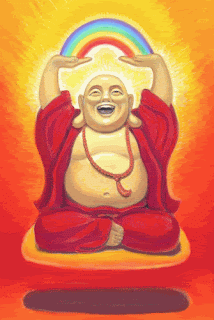
For the past three days, I attended lectures by the Dalai Lama at Radio City: teachings on Nagarjuna's Commentary on Bodhicitta and A Guide to the Bodhisattva's Way of Life by Shantideva. I didn't know what to expect, but I was thinking I would learn the secret of life and something new that would help me rise above the cubicle, New York crowds, petty problems, and selfish people. I was hoping it wouldn't be totally over my head. The first day, I got there at 8:30AM, and the first lecture lasted until 11:30, then the next one was from 1:30-3:30. I kept nodding off, and I was so tired and relaxed with the red and yellow warm colors, the Tibetan music and voices, and this echo chanting sound that resonates through Radio City. People were bowing and crying, and I felt sort of out of place, but fairly zen.
Richard Gere was there, and I kept hoping Julia Roberts in hooker garb would come onstage and entertain us. My mind kept wondering, and the Dalai Lama mentioned "Delhi" and all I could think of was what kind of sandwich I would order. He was a funny little man, wearing a visor which looked like a Red Sox hat. He kept laughing. Sometimes I couldn't understand his English, but he had a translator he used more often in Days 2 and 3. However, he would go on and on and on in Tibetan for many minutes at a time, which was the perfect opportunity to cat nap. It was very hard to stay conscious. His voice was deep and lulling, like Saruman the White, from Lord of the Rings, only the opposite of evil. He reminded me of Yoda. It was uncanny. He really was a happy Buddha. At the end of each day, he walked to the end of the stage and kind of waved at everyone and said "Hi." Then he shooed us away for lunch.
On the second day, I took notes to stay awake and I also drank coffee before the first session which helped. He talked about striving to feel and realize the self, which is emptiness, but not nothingness. There's a difference, because emptiness is part of life and the ultimate reality. We exist in dependence on the physical and mental aspects of ourselves, but when we die, the soul or emptiness continues. We're supposed to meditate to learn to tap into that emptiness, because it's the true peace.
Ignorance is the cause of suffering, because reality is distorted without the wisdom of karma and emptiness. Once these are understood, we're able to support and protect other people with compassion and kindness. We become more honest, and we're able to trust and respect. Afflictions, such as attachment to people or things, anger, and fear become less solid but will always be there, because is it part of life, the result of many conditions. We're supposed to recognize the destructive nature of hatred, rage, and greed (deadly sins) and not let them reign, by practicing patience and looking at the big picture which reminds us that these feelings are temporary and irrelevant, even an illusion because emotions d0 not exist independently. We have to guard our minds against these things every second.
The Evils: Attachment, Aversion, Ignorance
The Antidotes: Solitude, Patience, Wisdom
It's very mundane to base happiness on receiving praise, success, or money, while our enemies suffer. Or if our enemies succeed, we feel dissatisfied. This cycle destroys peace of mind. We need to be happy despite circumstances. Even if we can't feel compassion for someone, we at least shouldn't feel anger because it only destroys us. Be grateful to enemies, because they give us a chance to practice patience and resilience. There are many more causes for suffering than causes for happiness, but we still have to hope for the best, while preparing for the worst. Difficulties make us wiser and stronger and closer to the ultimate reality (lucid, undefiled mind/soul). Suffering becomes easier and through suffering, our arrogance goes away and is replaced with joy.
If there is a remedy, there is no need for frustration.
If there is no remedy, there is no need for frustration.
Day 3 was the best, because he applied the more abstract teachings to daily life. He said that any religion is only effective in relation to an individual's spiritual inclinations and mental disposition, justifying the existence of all world religions and beliefs. He said it's important to experiment, question, and learn until you understand what is best for you. This is something I never heard in church, which is the reason I stopped going. The Dalai Lama basically says it's okay to be a Doubting Thomas. It's not about literal translations or one religion being the right one, or the best one. It's about finding beliefs that are suitable to you by relying on your own criteria and reasoning. This seems far more advanced and wise than the belief system I was taught, in which you go to hell if you aren't Christian... The roads to hell are paved with the remains of those who thought they were right.
If we have confidence that we can achieve the highest state of being and make an effort, we will find the strength to do it. Specifically, the best daily practice is to eat a light vegetarian dinner at 7, go to bed at 10, and wake up early to meditate, which is focusing on the simple present without a thought about the past or future. The present is uncontrived. You can start with a mental image of a light or point on the body and then try to reflect on the deeper emptiness of the mind. Sounds easy enough to me.
No comments:
Post a Comment